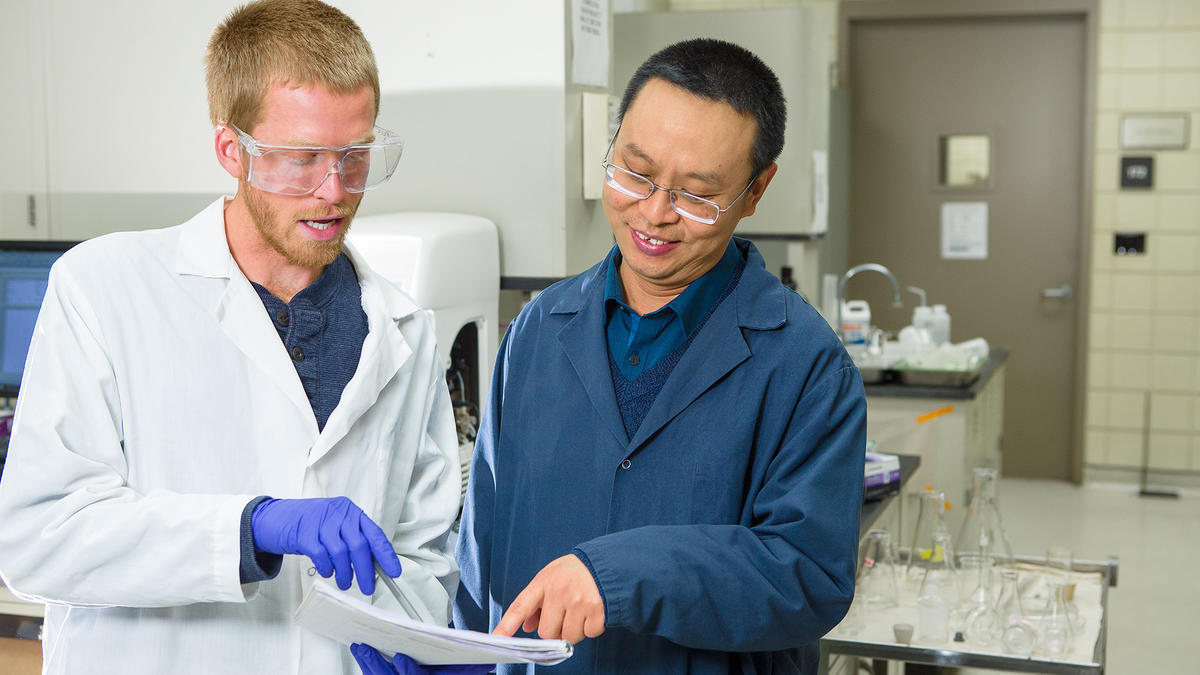By Katie Pratt
Sulfur found in biofuel feedstock could pose serious problems to the industry, because it causes pollution, is toxic to the catalyst and corrosive to biorefinery equipment. A national group of scientists and industry partners led by researchers at the University of Kentucky is studying ways to reduce sulfur levels in pine byproducts used to produce biofuels.
Pine byproducts, including the needles, bark and branches, are items left over from furniture or pulp production. While these byproducts are used by the biofuels industry, they often contain varying levels of sulfur. The sulfur levels of some byproducts are high enough to exceed U.S. Environmental Protection Agency standards, if the sulfur was carried over to biofuels.
Through a grant from the U.S. Department of Energy’s Office of Energy Efficiency and Renewable Energy, the research team led by Jian Shi, an assistant professor in the UK College of Agriculture, Food and Environment, will work to identify the reasons behind the sulfur variability in pine feedstocks by studying byproducts collected from across the nation.
“The sulfur could be coming from the soil, rain or air or contaminations during harvesting and transportation,” said Jian Shi, a faculty member in the UK Department of Biosystems and Agricultural Engineering. “We hope to better understand how sulfur accumulates in biofuel feedstocks, what happens to the sulfur during thermochemical conversion, how to remove sulfur and improve gasification efficiency.”
Shi’s lab along with other collaborators will identify sulfur sources and levels in different pine byproducts and determine the fate of sulfur during thermochemical conversion.
Kentucky with its coal mining industry is uniquely positioned to tackle this problem, Shi said.
“For decades, the coal industry has worked on cleaning the sulfur from the coal during the energy production process, but few have studied how to remove sulfur from biofuel feedstocks,” Shi said. “We hope to learn from the experience of the coal industry to develop a sustainable solution for biofuels.”
With the DOE grant and cost-share dollars from universities and the industry, the project will total more than $2 million. Partners include researchers from UK’s Center for Applied Energy Research, Kansas State University, Idaho National Laboratory, Mississippi State University and Red Rocks Biofuels.
Mark Crocker, UK chemistry professor and CAER’s associate director of biofuels and environmental catalysis, is a co-primary investigator on the grant. He has extensive expertise on how biomass is converted into energy.
“Developing technologies that positively impact Kentucky industry is a hallmark of the Center for Applied Energy Research,” Crocker said. “This project is an extension of my laboratory’s interest in creating sustainable biofuels solutions, and we look forward to partnering with Dr. Shi to understand the effects of sulfur on biofuel production.”
Muthu Kumaran Gnanamani, a senior research scientist with CAER, is also a part of the study.
“By successfully completing this project, we expect to contribute new knowledge to increase sustainable domestic biofuel production and national energy security and reduce greenhouse gas emissions,” Shi said.
This material is based upon work supported by the U.S. Department of Energy’s Office of Energy Efficiency and Renewable Energy (EERE) under the “FY19 Bioenergy Technologies Office Multi-Topic Funding Opportunity Announcement, DE-FOA-0002029, Award Number DE-EE0008909.
